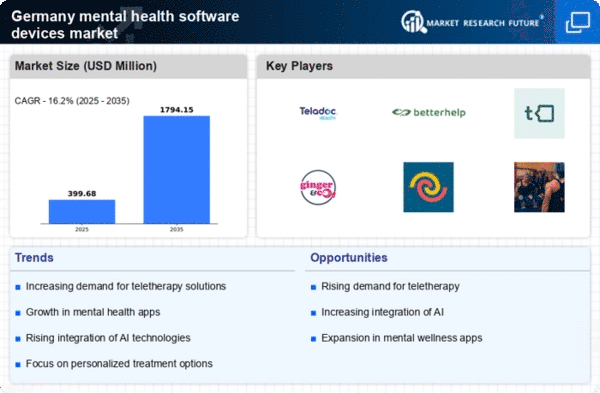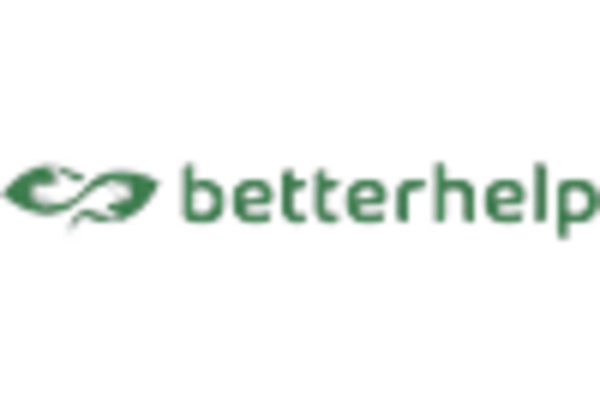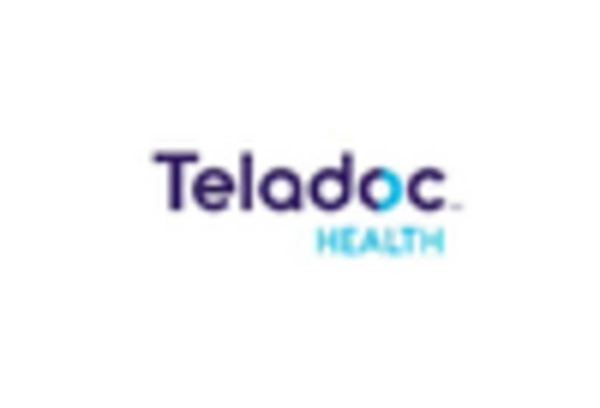Rising Mental Health Awareness
The increasing awareness surrounding mental health issues in Germany appears to be a significant driver for the mental health-software-devices market. Public campaigns and educational initiatives have contributed to a cultural shift, encouraging individuals to seek help and utilize available resources. According to recent surveys, approximately 30% of the German population acknowledges experiencing mental health challenges, which has led to a growing demand for innovative solutions. This heightened awareness is likely to propel the adoption of software and devices designed to support mental well-being, as individuals become more proactive in managing their mental health. Furthermore, the German government has been investing in mental health initiatives, which may further stimulate the market by providing funding and support for technological advancements in this sector.
Government Support and Regulation
Government support and regulation are pivotal in fostering the growth of the mental health-software-devices market. In Germany, the government has implemented various policies aimed at improving mental health services, including the Digital Healthcare Act, which encourages the use of digital health applications. This legislative framework not only provides a pathway for reimbursement of mental health software but also ensures that these solutions meet specific quality standards. As a result, the market is likely to experience increased investment and innovation, as developers seek to comply with regulatory requirements while addressing the needs of mental health professionals and patients. The potential for government-backed initiatives to enhance accessibility and affordability of mental health solutions may further stimulate market growth.
Increased Demand for Remote Monitoring
The demand for remote monitoring solutions in mental health care is on the rise, significantly impacting the mental health-software-devices market. With a growing emphasis on continuous care and real-time data collection, healthcare providers in Germany are increasingly adopting software and devices that facilitate remote monitoring of patients' mental health. This trend is driven by the need for timely interventions and personalized treatment plans, which can be effectively managed through digital platforms. Research indicates that remote monitoring tools can improve patient outcomes by up to 25%, making them an attractive option for both providers and patients. As the healthcare landscape evolves, the integration of remote monitoring solutions is likely to become a standard practice, further propelling the market.
Technological Advancements in Software
Technological advancements in software development are playing a crucial role in shaping the mental health-software-devices market. Innovations such as artificial intelligence (AI) and machine learning are enabling the creation of more sophisticated applications that can provide personalized mental health support. In Germany, the market for mental health applications is projected to grow at a CAGR of 15% over the next five years, driven by these technological improvements. Enhanced user interfaces and data analytics capabilities allow for better user engagement and outcomes, making these tools more appealing to both consumers and healthcare providers. As technology continues to evolve, it is likely that the mental health-software-devices market will see an influx of new products that cater to diverse mental health needs.
Focus on Preventive Mental Health Solutions
The focus on preventive mental health solutions is emerging as a key driver for the mental health-software-devices market. In Germany, there is a growing recognition of the importance of early intervention and preventive measures in mental health care. This shift is leading to an increased demand for software and devices that promote mental well-being and resilience. Programs aimed at stress management, mindfulness, and emotional regulation are gaining traction, with many organizations investing in digital tools to support their employees' mental health. The market for preventive mental health solutions is expected to expand, as more individuals and organizations prioritize mental wellness. This proactive approach may not only enhance the quality of life for users but also reduce the long-term costs associated with mental health treatment.
















